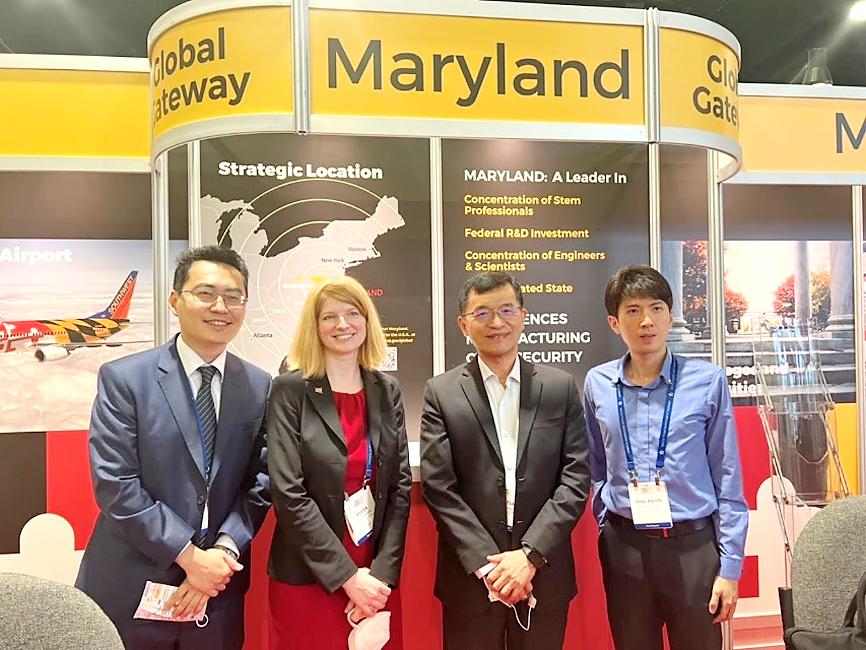Two Taiwanese start-ups won top prizes at the SelectUSA Tech competition in Maryland last week, while another local firm placed second in its category, the Ministry of Economic Affairs said on Saturday.
Fourteen start-ups from Taiwan competed in seven major categories against 100 finalists from around the world in the SelectUSA Tech, which is part of the SelectUSA Investment Summit held from June 26 to Wednesday last week, the ministry said in a statement.
Among the Taiwanese contenders, Astron MedTech Co (艾斯創生醫), established by Taiwan Accelerator Plus (TAcc+), won in the MedTech Software category, while Lydsec Digital Technology Co (來毅數位科技) took the top prize in the Cybersecurity category, the ministry said.

Photo courtesy of the Ministry of Economic Affairs
A third Taiwanese start-up, CancerFree Biotec Ltd (精拓生技), took second prize in the MedTech Software category, it said.
The other major categories were CleanTech, eCommerce & Retail Tech, FinTech and a general category called Other.
At the summit, Small and Medium Enterprise Administration Director-General Ho Chin-tsang (何晉滄) met with Maryland Department of Commerce Director Jessica Reynolds to discuss establishing a start-up exchange platform between Taiwan and the state, the ministry said.
Ho and Reynolds agreed that Taiwan’s Startup Terrace village in New Taipei City, the Asia New Bay Area 5G AIoT Innovation Park in Kaohsiung and TAcc+ should work with innovation accelerators in Maryland to help more start-ups, the ministry said.
After the SelectUSA Summit, Ho and representatives of 23 Taiwanese start-ups were invited by the American Institute in Taiwan (AIT) to visit California’s Silicon Valley to seek potential investors, as part of an effort to boost the visibility of Taiwanese start-ups in the US market, it said.
The Taiwanese representatives also attended a NextGen Telecom roundtable hosted by the AIT, it added.
The SelectUSA Summit, an annual event sponsored by the US Department of Commerce, focuses on facilitating job-creating investments in the US.
This year, National Development Council Minister Kung Ming-hsin (龔明鑫) led a 41-member delegation to the meeting, aiming to increase exchanges in the tech sector — in particular, semiconductors, artificial intelligence, telecoms and space exploration.
Start-ups from Hungary, the Netherlands, Israel and Portugal were among the winners this year.

SEMICONDUCTORS: The German laser and plasma generator company will expand its local services as its specialized offerings support Taiwan’s semiconductor industries Trumpf SE + Co KG, a global leader in supplying laser technology and plasma generators used in chip production, is expanding its investments in Taiwan in an effort to deeply integrate into the global semiconductor supply chain in the pursuit of growth. The company, headquartered in Ditzingen, Germany, has invested significantly in a newly inaugurated regional technical center for plasma generators in Taoyuan, its latest expansion in Taiwan after being engaged in various industries for more than 25 years. The center, the first of its kind Trumpf built outside Germany, aims to serve customers from Taiwan, Japan, Southeast Asia and South Korea,

Gasoline and diesel prices at domestic fuel stations are to fall NT$0.2 per liter this week, down for a second consecutive week, CPC Corp, Taiwan (台灣中油) and Formosa Petrochemical Corp (台塑石化) announced yesterday. Effective today, gasoline prices at CPC and Formosa stations are to drop to NT$26.4, NT$27.9 and NT$29.9 per liter for 92, 95 and 98-octane unleaded gasoline respectively, the companies said in separate statements. The price of premium diesel is to fall to NT$24.8 per liter at CPC stations and NT$24.6 at Formosa pumps, they said. The price adjustments came even as international crude oil prices rose last week, as traders

Taiwan Semiconductor Manufacturing Co (TSMC, 台積電), which supplies advanced chips to Nvidia Corp and Apple Inc, yesterday reported NT$1.046 trillion (US$33.1 billion) in revenue for last quarter, driven by constantly strong demand for artificial intelligence (AI) chips, falling in the upper end of its forecast. Based on TSMC’s financial guidance, revenue would expand about 22 percent sequentially to the range from US$32.2 billion to US$33.4 billion during the final quarter of 2024, it told investors in October last year. Last year in total, revenue jumped 31.61 percent to NT$3.81 trillion, compared with NT$2.89 trillion generated in the year before, according to

PRECEDENTED TIMES: In news that surely does not shock, AI and tech exports drove a banner for exports last year as Taiwan’s economic growth experienced a flood tide Taiwan’s exports delivered a blockbuster finish to last year with last month’s shipments rising at the second-highest pace on record as demand for artificial intelligence (AI) hardware and advanced computing remained strong, the Ministry of Finance said yesterday. Exports surged 43.4 percent from a year earlier to US$62.48 billion last month, extending growth to 26 consecutive months. Imports climbed 14.9 percent to US$43.04 billion, the second-highest monthly level historically, resulting in a trade surplus of US$19.43 billion — more than double that of the year before. Department of Statistics Director-General Beatrice Tsai (蔡美娜) described the performance as “surprisingly outstanding,” forecasting export growth